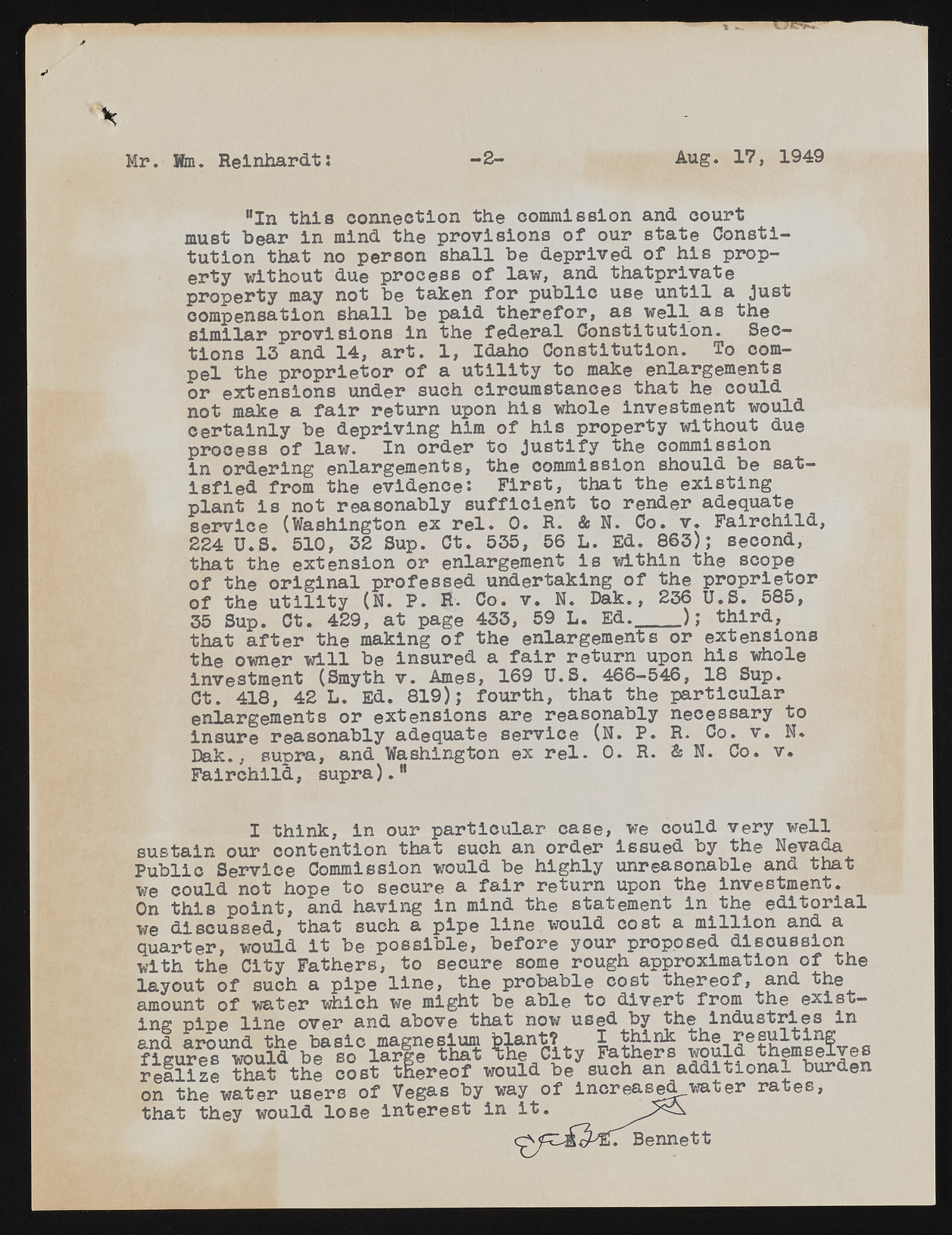Copyright & Fair-use Agreement
UNLV Special Collections provides copies of materials to facilitate private study, scholarship, or research. Material not in the public domain may be used according to fair use of copyrighted materials as defined by copyright law. Please cite us.
Please note that UNLV may not own the copyright to these materials and cannot provide permission to publish or distribute materials when UNLV is not the copyright holder. The user is solely responsible for determining the copyright status of materials and obtaining permission to use material from the copyright holder and for determining whether any permissions relating to any other rights are necessary for the intended use, and for obtaining all required permissions beyond that allowed by fair use.
Read more about our reproduction and use policy.
I agree.Information
Digital ID
Permalink
Details
More Info
Rights
Digital Provenance
Publisher
Transcription
Mr. Hm. Reinhardt: -2- Aug. 17, 1949 "In this connection the commission and court must hear in mind the provisions of our state Constitution that no person shall be deprived of his property without due process of law, and thatprivate property may not be taken for public use until a Just compensation shall be paid therefor, as well as the similar provisions in the federal Constitution. Sections 13 and 14, art. 1, Idaho Constitution. To compel the proprietor of a utility to make enlargements or extensions under such circumstances that he could not make a fair return upon his whole investment would certainly be depriving him of his property without due process of law. In order to justify the commission in ordering enlargements, the commission should be satisfied from the evidence: First, that the existing plant is not reasonably sufficient to render adequate service (Washington ex rel. 0. R. & N. Co. v. Fairchild, 224 U.S. 510, 32 Sup. Ct. 535, 56 L. Ed. 863); second, that the extension or enlargement is within the scope of the original professed undertaking of the proprietor of the utility (N. P. R. Co. v. N. Dak., 236 U.S. 585, 35 Sup. Ct. 429, at page 433, 59 L. Ed.____); third, that after the making of the enlargements or extensions the owner will be insured a fair return upon his whole investment (Smyth v. Ames, 169 U.S. 466-546, 18 Sup. Ct. 418, 42 L. Ed. 819); fourth, that the particular enlargements or extensions are reasonably necessary to Insure reasonably adequate service (H. P» R- Co. v. N. Dak., supra, and Washington ex rel. 0. R. & H. Co. v. Fairchild, supra)." I I think, in our particular case, we could very well sustain our contention that such an order issued by the Nevada Public Service Commission would be highly unreasonable and that we could not hope to secure a fair return upon the investment. On this point, and having in mind the statement in the editorial we discussed, that such a pipe line would cost a million and a quarter, would it be possible, before your proposed discussion with the City Fathers, to secure some rough approximation of the layout of such a pipe line, the probable cost thereof, and the amount of water which we might be able to divert from the existing pipe line over and above that now used by the industries in flT»nnnd th*» basic magnesium blant? I think figures^rould be so large that ?he City Fathers twhoeu lrde stuhletmisnegl ves realize that the cost thereof would be such an additional burden on the water users of Vegs-s by way of increased water rates, that they would lose interest in it. . Bennett

